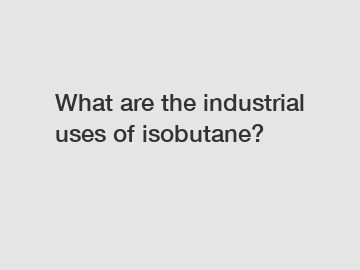What are the industrial uses of isobutane?
What are the industrial uses of isobutane?
Isobutane, also known as 2-methylpropane, is a colorless and odorless gas that is widely used in various industries. It is a highly flammable hydrocarbon with a molecular formula of C4H10. Isobutane is derived from petroleum refining and natural gas processing, and its unique properties make it an indispensable component in many industrial applications. Let's explore some of the notable uses of isobutane.
1. Refrigeration and Air Conditioning:

Isobutane plays a vital role in the field of refrigeration and air conditioning. It is commonly used as a refrigerant in domestic refrigerators and freezers, as well as in commercial applications like supermarkets. With its low boiling point and excellent cold storage capabilities, isobutane is an effective replacement for chlorofluorocarbons (CFCs) and hydrochlorofluorocarbons (HCFCs) which have been phased out due to their harmful effects on the ozone layer. Isobutane-based refrigerants offer high energy efficiency and are environmentally friendly, making them the preferred choice in many cooling systems.
2. Propellant in Aerosol Products:
Another major industrial use of isobutane is as a propellant in aerosol products. Isobutane's low boiling point and gaseous state at room temperature make it ideal for maintaining pressure within aerosol cans, allowing controlled and efficient release of the product. It is commonly used in products such as hairsprays, deodorants, shaving creams, and air fresheners. Isobutane's non-toxic nature and absence of ozone-depleting substances further contribute to its popularity as a propellant.
3. Liquefied Petroleum Gas (LPG):
Isobutane is a significant component of liquefied petroleum gas (LPG), a widely used fuel for heating, cooking, and transportation purposes. With its high energy content and clean combustion characteristics, LPG is a preferred choice in many households and industries. Isobutane, along with propane, butane, and other hydrocarbons, contributes to the composition of LPG, providing an efficient and versatile fuel source.
4. Solvent:
Isobutane finds extensive use as a solvent in various industrial applications. Its solvency power makes it suitable for dissolving and diluting a wide range of substances, including waxes, oils, resins, and polymers. Isobutane-based solvents are commonly used in the manufacturing of adhesives, sealants, automotive products, and printing inks. The non-reactive nature of isobutane makes it a safe and effective option for many solvent-based processes.
5. Fuel Additive:
Isobutane is used as a fuel additive in gasoline to enhance its octane rating. The addition of isobutane improves the combustion efficiency and performance of gasoline, reducing engine knocking and enhancing engine power. The use of isobutane as a blending component in gasoline also helps in meeting emission control requirements and increasing fuel economy.
In conclusion, isobutane finds widespread industrial applications due to its unique properties and versatility. Whether it is cooling systems, aerosol products, fuel sources, solvents, or fuel additives, isobutane plays a crucial role in various industries. Its low boiling point, non-toxic nature, and environmental friendliness make it an attractive choice for many applications. As industries continue to evolve and prioritize sustainability, the demand for isobutane and its applications are expected to grow further, driving innovations and advancements in the industrial sector.
If you want to learn more, please visit our website nitrous oxide gas supplier, un 2203, specialty gas products.

Comments